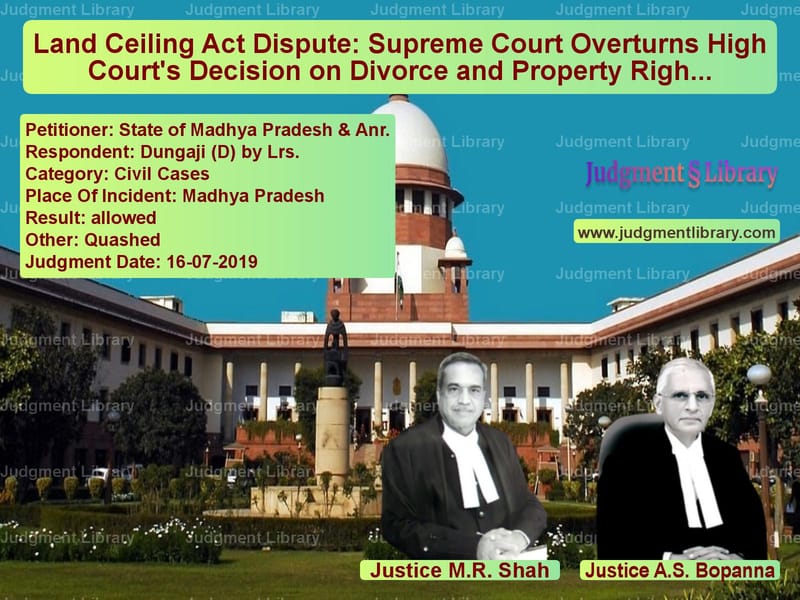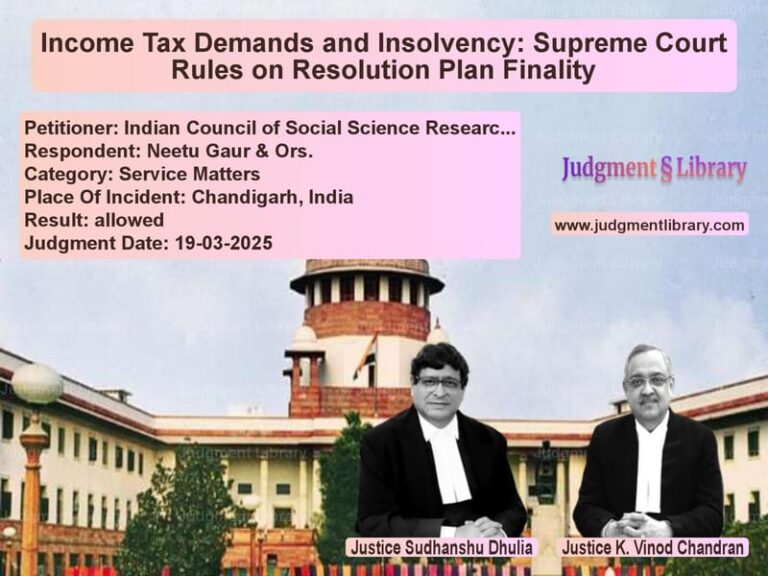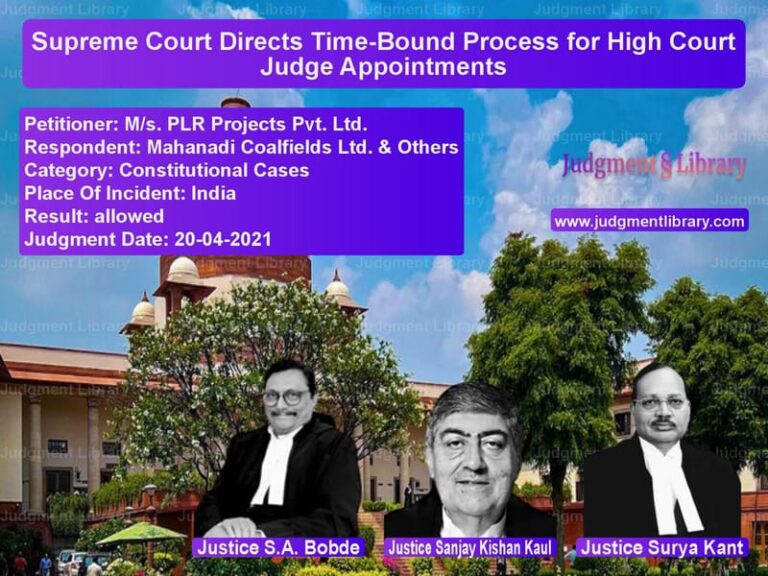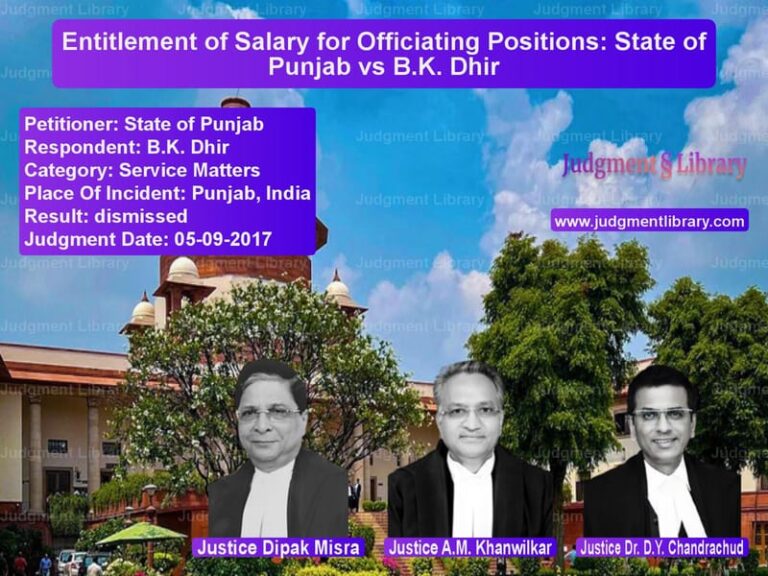Land Ceiling Act Dispute: Supreme Court Overturns High Court’s Decision on Divorce and Property Rights
The case of State of Madhya Pradesh & Anr. vs. Dungaji (D) by Lrs. concerns the interpretation of the Madhya Pradesh Ceiling on Agricultural Holdings Act, 1960, and the determination of surplus land. The Supreme Court ruled that the lower courts had incorrectly interfered with the Competent Authority’s decision declaring 57.32 acres of land as surplus, and that the customary divorce between Dungaji and his wife Kaveribai could not affect the agricultural land classification.
The dispute arose when Kaveribai, wife of Dungaji, inherited land from her mother in 1966. In 1976, the Competent Authority included this land in the family holdings for the purposes of determining surplus land under the Ceiling Act, despite Dungaji claiming he had divorced Kaveribai. The High Court ruled that the customary divorce dissolved the marriage, making the land inherited by Kaveribai separate property, which should not have been considered family land. The Supreme Court overturned this decision, ruling in favor of the state.
Background of the Case
The key events leading to the dispute were:
- In 1966, Kaveribai inherited 19.89 hectares of land after her mother’s death.
- She sold the land in 1971 through a Sale Deed.
- The Competent Authority, in 1976, treated Kaveribai as a member of the family of Dungaji and included her inherited land in the family’s surplus land calculation.
- Dungaji filed a civil suit to challenge the order, claiming that he had divorced Kaveribai 17 years earlier according to customary practice.
- The trial court dismissed the suit, but the High Court ruled in favor of Dungaji, declaring the customary divorce valid and the land separate.
- The state appealed to the Supreme Court.
Petitioner’s Arguments
The State of Madhya Pradesh, represented by its counsel, made the following arguments:
- The High Court erred in allowing the appeal and holding that the customary divorce occurred.
- The suit filed by Dungaji was barred under Section 46 of the Ceiling Act, which precludes Civil Courts from adjudicating such matters.
- The High Court failed to appreciate the concurrent findings of fact recorded by the trial court and the first appellate court that Dungaji had failed to prove the divorce.
- The Competent Authority had followed the mandatory procedure under the Ceiling Act and properly included the land in question in the surplus land calculation.
Respondent’s Arguments
On behalf of the respondent, Dungaji, it was argued:
- The divorce between Dungaji and Kaveribai had been duly conducted as per customary practice in their community and the land held by Kaveribai after the divorce should not be included in the family holdings.
- The trial court’s dismissal of the suit was based on incorrect findings, and the High Court had rightly set aside this decision.
- The Competent Authority had ignored the customary divorce and wrongly included Kaveribai’s inherited land in the surplus land calculation.
Supreme Court’s Observations
The Supreme Court bench, comprising M.R. Shah and A.S. Bopanna, made the following key observations:
- The customary divorce was not conclusively proven by the respondent. Both the trial court and first appellate court found the evidence insufficient to establish the divorce.
- Even if a customary divorce had occurred, the competent authority acted within its jurisdiction by considering the land as part of the family holdings for the surplus land calculation.
- The High Court erred in interfering with the factual findings of the lower courts, especially under Section 100 of the Civil Procedure Code, which limits the scope of second appeals.
- The suit filed by Dungaji challenging the order was not maintainable, as Civil Courts have no jurisdiction under Section 46 of the Ceiling Act to challenge the Competent Authority’s decision.
Critical Judgment Excerpt: “The High Court has materially erred in quashing and setting aside the order passed by the Competent Authority on the surplus land. The concurrent findings of fact recorded by the trial and first appellate courts should not have been disturbed by the High Court.”
Final Decision
The Supreme Court ruled as follows:
- The appeal by the State of Madhya Pradesh was allowed.
- The High Court’s judgment was quashed and set aside.
- The suit filed by Dungaji was dismissed, and the order of the Competent Authority declaring 57.32 acres as surplus land was upheld.
Implications of the Judgment
This ruling has significant implications for land ceiling disputes and jurisdictional matters:
- Clarifies the jurisdictional limits of Civil Courts in land ceiling disputes under the Act.
- Reaffirms the authority of Competent Authorities in determining surplus land under the Ceiling Act.
- Reinforces the principle that factual findings by lower courts should not be easily disturbed by second appeals under Section 100 of the CPC.
- Protects the procedural integrity of land surplus determinations made under the Ceiling Act.
Legal Precedents and Framework
The Supreme Court’s ruling aligns with key legal principles regarding land ceilings and jurisdiction:
- Sooraj v. SDO (1995) – Strengthened the interpretation of jurisdictional bars under land ceiling laws.
- Union of India v. Shri Kant Sharma (2015) – Emphasized the authority of Competent Authorities under the Ceiling Act.
- Dhulabhai v. State of Madhya Pradesh (1969) – Established that Civil Courts cannot interfere in matters governed by specific statutes barring their jurisdiction.
Conclusion
The Supreme Court’s decision in State of Madhya Pradesh vs. Dungaji reaffirms the proper application of the Madhya Pradesh Ceiling on Agricultural Holdings Act, 1960, and the jurisdictional limitations of Civil Courts. By upholding the decision of the Competent Authority, the Court has reinforced the authority of regulatory bodies in agricultural land matters and clarified the scope of customary divorce in property disputes.
Petitioner Name: State of Madhya Pradesh & Anr..Respondent Name: Dungaji (D) by Lrs..Judgment By: Justice M.R. Shah, Justice A.S. Bopanna.Place Of Incident: Madhya Pradesh.Judgment Date: 16-07-2019.
Don’t miss out on the full details! Download the complete judgment in PDF format below and gain valuable insights instantly!
Download Judgment: State of Madhya Prad vs Dungaji (D) by Lrs. Supreme Court of India Judgment Dated 16-07-2019.pdf
Direct Downlaod Judgment: Direct downlaod this Judgment
See all petitions in Property Disputes
See all petitions in Contract Disputes
See all petitions in Judgment by Mukeshkumar Rasikbhai Shah
See all petitions in Judgment by A. S. Bopanna
See all petitions in allowed
See all petitions in Quashed
See all petitions in supreme court of India judgments July 2019
See all petitions in 2019 judgments
See all posts in Civil Cases Category
See all allowed petitions in Civil Cases Category
See all Dismissed petitions in Civil Cases Category
See all partially allowed petitions in Civil Cases Category







